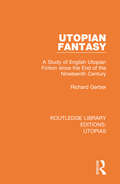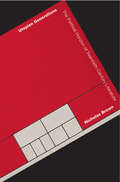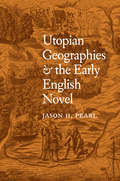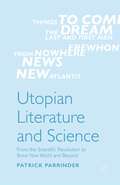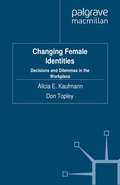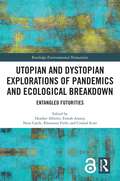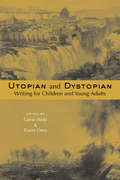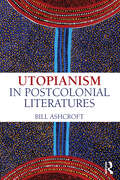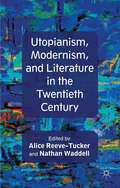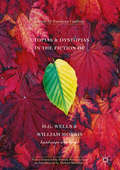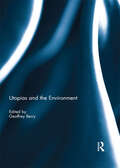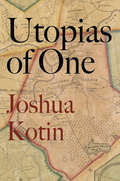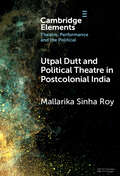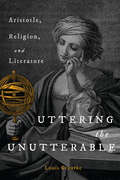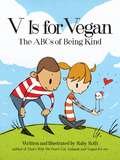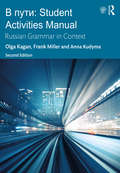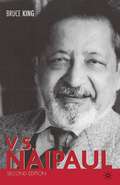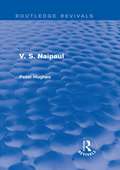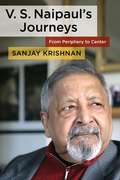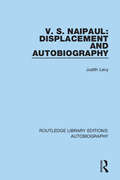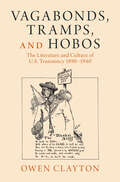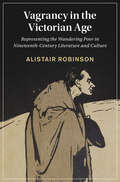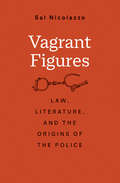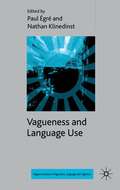- Table View
- List View
Utopian Fantasy: A Study of English Utopian Fiction since the End of the Nineteenth Century (Routledge Library Editions: Utopias)
by Richard GerberThis book, originally published in 1955 and reissued in 1973, is a study of the flourishing of an ancient literary form which had only recently been recognized and systematically studied as a proper genre – utopian fiction. Beginning with the imaginary journeys of writers like H. G. Wells at the end of the nineteenth century, Professor Gerber traces the evolving themes and forms of the genre through their culmination in the sophisticated nightmares of Aldous Huxley and George Orwell. It is a two-fold transformation: On the one hand, the optimism of social reformers whose visions of the future were nurtured by the theories of Darwin and the triumph of science and industry gradually gives way to the pessimism of moral philosophers alarmed at the power science and technology have put at the disposal of totalitarian rulers. On the other hand, the earlier writers’ dependence on framing and distancing devices for their stories and heavy emphasis on technical details give way to the subtlety of complex psychological novels whose artistry makes the reader a citizen of the tragic worlds depicted.
Utopian Generations: The Political Horizon of Twentieth-Century Literature (Translation/Transnation #11)
by Nicholas BrownUtopian Generations develops a powerful interpretive matrix for understanding world literature--one that renders modernism and postcolonial African literature comprehensible in a single framework, within which neither will ever look the same. African literature has commonly been seen as representationally naïve vis-à-vis modernism, and canonical modernism as reactionary vis-à-vis postcolonial literature. What brings these two bodies of work together, argues Nicholas Brown, is their disposition toward Utopia or "the horizon of a radical reconfiguration of social relations.? Grounded in a profound rethinking of the Hegelian Marxist tradition, this fluently written book takes as its point of departure the partial displacement during the twentieth century of capitalism's "internal limit" (classically conceived as the conflict between labor and capital) onto a geographic division of labor and wealth. Dispensing with whole genres of commonplace contemporary pieties, Brown examines works from both sides of this division to create a dialectical mapping of different modes of Utopian aesthetic practice. The theory of world literature developed in the introduction grounds the subtle and powerful readings at the heart of the book--focusing on works by James Joyce, Cheikh Hamidou Kane, Ford Madox Ford, Chinua Achebe, Wyndham Lewis, Ngugi wa Thiong'o, and Pepetela. A final chapter, arguing that this literary dialectic has reached a point of exhaustion, suggests that a radically reconceived notion of musical practice may be required to discern the Utopian desire immanent in the products of contemporary culture.
Utopian Geographies and the Early English Novel
by Jason H. PearlHistorians of the Enlightenment have studied the period's substantial advances in world cartography, as well as the decline of utopia imagined in geographic terms. Literary critics, meanwhile, have assessed the emerging novel's realism and in particular the genre's awareness of the wider world beyond Europe. Jason Pearl unites these lines of inquiry in Utopian Geographies and the Early English Novel, arguing that prose fiction from 1660 to 1740 helped demystify blank spaces on the map and make utopia available anywhere. This literature incorporated, debunked, and reformulated utopian conceptions of geography. Reports of ideal societies have always prompted skepticism, and it is now common to imagine them in the future, rather than on some undiscovered island or continent. At precisely the time when novels began turning from the fabulous settings of romance to the actual locations described in contemporaneous travel accounts, a number of writers nevertheless tried to preserve and reconfigure utopia by giving it new coordinates and parameters. Margaret Cavendish, Aphra Behn, Daniel Defoe, Jonathan Swift, and others told of adventurous voyages and extraordinary worlds. They engaged critically and creatively with the idea of utopia. If these writers ultimately concede that utopian geographies were nowhere to be found, they also reimagine the essential ideals as new forms of interiority and sociability that could be brought back to England. Questions about geography and utopia drove many of the formal innovations of the early novel. As this book shows, what resulted were new ways of representing both world geography and utopian possibility.
Utopian Literature and Science: From the Scientific Revolution to Brave New World and Beyond
by Patrick ParrinderScientific progress is usually seen as a precondition of modern utopias, but science and utopia are frequently at odds. Ranging from Galileo's observations with the telescope to current ideas of the post-human and the human-animal boundary, this study brings a fresh perspective to the paradoxes of utopian thinking since Plato.
Utopian Spaces of Modernism: Decisions and Dilemmas in the Workplace
by Rosalyn Gregory Benjamin KohlmannChanging Female Identities explores the influence of parental figures, the role models that women adopt, the diverse feelings that arise as a result of family mandates and the emotions that arise from cooperation or competition among siblings.
Utopian and Dystopian Explorations of Pandemics and Ecological Breakdown: Entangled Futurities (ISSN)
by Conrad Scott Rhiannon Firth Heather Alberro Nora Castle Emrah AtasoyThis edited collection, which is situated within the environmental humanities and environmental social sciences, brings together utopian and dystopian representations of pandemics from across literature, the arts, and social movements.Featuring analyses of literary works, TV and film, theater, politics, and activism, the chapters in this volume home in on critical topics such as posthumanism, multispecies futures, agency, political ecology, environmental justice, and Indigenous and settler-colonial environmental relations. The book asks: how do pandemics and ecological breakdown show us the ways that humans are deeply interconnected with the more-than-human world? And what might we learn from exploring those entanglements, both within creative works and in lived reality? Brazilian, Indian, Polish, and Dutch texts feature alongside classic literary works like Defoe’s A Journal of a Plague Year (1722) and Matheson’s I Am Legend (1954), as well as broader takes on movements like global youth climate activism. These investigations are united by their thematic interests in the future of human and nonhuman relationships in the shadow of climate emergency and increasing pandemic risk, as well as in the glimmers of utopian hope they exhibit for the creation of more just futures.This exploration of how pandemics illuminate the entangled materialities and shared vulnerabilities of all living things is an engaging and timely analysis that will appeal to environmentally minded researchers, academics, and students across various disciplines within the humanities and social sciences.
Utopian and Dystopian Writing for Children and Young Adults: Utopian And Dystopian Writing For Children And Young Adults (Children's Literature and Culture #29)
by Carrie Hintz Elaine OstryThis volume examines a variety of utopian writing for children from the 18th century to the present day, defining and exploring this new genre in the field of children's literature. The original essays discuss thematic conventions and present detailed case studies of individual works. All address the pedagogical implications of work that challenges children to grapple with questions of perfect or wildly imperfect social organizations and their own autonomy. The book includes interviews with creative writers and the first bibliography of utopian fiction for children.
Utopianism in Postcolonial Literatures
by Bill AshcroftPostcolonial Studies is more often found looking back at the past, but in this brand new book, Bill Ashcroft looks to the future and the irrepressible demands of utopia. The concept of utopia – whether playful satire or a serious proposal for an ideal community – is examined in relation to the postcolonial and the communities with which it engages. Studying a very broad range of literature, poetry and art, with chapters focussing on specific regions – Africa, India, Chicano, Caribbean and Pacific – this book is written in a clear and engaging prose which make it accessible to undergraduates as well as academics. This important book speaks to the past and future of postcolonial scholarship.
Utopianism in Postcolonial Literatures
by Bill AshcroftPostcolonial Studies is more often found looking back at the past, but in this brand new book, Bill Ashcroft looks to the future and the irrepressible demands of utopia. The concept of utopia – whether playful satire or a serious proposal for an ideal community – is examined in relation to the postcolonial and the communities with which it engages. Studying a very broad range of literature, poetry and art, with chapters focussing on specific regions – Africa, India, Chicano, Caribbean and Pacific – this book is written in a clear and engaging prose which make it accessible to undergraduates as well as academics. This important book speaks to the past and future of postcolonial scholarship.
Utopianism, Modernism, and Literature in the Twentieth Century
by Nathan Waddell Alice Reeve-TuckerUtopianism, Modernism, and Literature in the Twentieth Century considers the links between utopianism and modernism in two ways: as an under-theorized nexus of aesthetic and political interactions; and as a sphere of confluences that challenges accepted critical models of modernist and twentieth-century literary history. An international group of scholars considers works by E. M. Forster, Ford Madox Ford, Wyndham Lewis, Naomi Mitchison, Katharine Burdekin, Rex Warner, Yevgeny Zamyatin, Thomas Pynchon, Elizabeth Bowen, James Baldwin, Toni Morrison, and Ernst Bloch. In doing so, this volume's contributors prompt new reflections on key aspects of utopianism in experimental twentieth-century literature and non-fictional writing; deepen literary-historical understandings of modernism's socio-political implications; and bear out the on-going relevance of modernism's explorations of utopian thought. Utopianism, Modernism, and Literature in the Twentieth Century will appeal to anyone with an interest in how deeply and how differently modernist writers, as well as writers influenced by or resistant to modernist styles, engaged with issues of utopianism, perfectibility, and social betterment.
Utopias and Dystopias in the Fiction of H. G. Wells and William Morris
by Emelyne GodfreyThis book is about the fiercely contrasting visions of two of the nineteenth century's greatest utopian writers. A wide-ranging, interdisciplinary study, it emphasizes that space is a key factor in utopian fiction, often a barometer of mankind's successful relationship with nature, or an indicator of danger. Emerging and critically acclaimed scholars consider the legacy of two great utopian writers, exploring their use of space and time in the creation of sites in which contemporary social concerns are investigated and reordered. A variety of locations is featured, including Morris's quasi-fourteenth century London, the lush and corrupted island, a routed and massacred English countryside, the high-rises of the future and the vertiginous landscape of another Earth beyond the stars.
Utopias and the Environment
by Geoffrey BerryUtopias and the Environment explores the way in which the kind of ‘dreaming’, or re-visioning, known as the ‘utopian imaginary’ takes environmental concerns into account. This kind of creative intervention is increasingly important in an era of ecological crisis, as we witness the failure of governments worldwide to significantly change industrial civilization from a path of ‘business as usual.’ In this context, it is up to the artists – in this case authors – to imagine new ways of being that respond to this imperative and immediate global issue. Concurrently, it is also up to critics, readers, and thinkers everywhere to appraise these narratives of possibility for their complexities and internal conflicts, as well as for their promise, as we enter this new era of rapid change and adaptation. Because creative and critical thinkers must work together towards this goal, the idea of the critical utopia, coined by Tom Moylan in response to the fiction of the 1970s, is now ingrained in the common argot and is one of the key ideas discussed in this book. This development in the genre, which combines self-reflexivity and multiple perspectives within its dreaming, represents the postmodern spirit in its most regenerative aspect. This book is testament to such hopes and potential realities. This book was originally published as a special issue of Green Letters.
Utopias of One
by Joshua KotinUtopias fail. Utopias of one do not. They are perfect worlds. Yet their success comes at a cost. They are radically singular—and thus exclusive and inimitable.Utopias of One is a major new account of utopian writing. Joshua Kotin examines how eight writers—Henry David Thoreau, W. E. B. Du Bois, Osip and Nadezhda Mandel’shtam, Anna Akhmatova, Wallace Stevens, Ezra Pound, and J. H. Prynne—construct utopias of one within and against modernity’s two large-scale attempts to harmonize individual and collective interests: liberalism and communism. The book begins in the United States between the buildup to the Civil War and the end of Jim Crow; continues in the Soviet Union between Stalinism and the late Soviet period; and concludes in England and the United States between World War I and the end of the Cold War. The book, in this way, captures how writers from disparate geopolitical contexts resist state and normative power to construct perfect worlds—for themselves alone.Utopias of One makes a vital contribution to debates about literature and politics, presenting innovative arguments about aesthetic difficulty, personal autonomy, and complicity and dissent. The book also models a new approach to transnational and comparative scholarship, combining original research in English and Russian to illuminate more than a century and a half of literary and political history.
Utpal Dutt and Political Theatre in Postcolonial India (Elements in Theatre, Performance and the Political)
by Mallarika Sinha RoyAmong the most significant playwrights and theatre-makers of postcolonial India, Utpal Dutt (1929–1993), was an early exponent of rethinking colonial history through political theatre. Dutt envisaged political theatre as part of the larger Marxist project, and his incorporation of new developments in Marxist thinking, including the contributions of Antonio Gramsci, makes it possible to conceptualise his protagonists as insurgent subalterns. A decolonial approach to staging history remained a significant element in Dutt's artistic project. This Element examines Dutt's passionate engagement with Marxism and explores how this sense of urgency was actioned through the writing and producing of plays about the peasant revolts and armed anti-colonial movements which took place during the period of British rule. Drawing on contemporary debates in political theatre regarding the autonomy of the spectator and the performance of history, the author locates Dutt's political theatre in a historical frame.
Uttering the Unutterable: Aristotle, Religion, and Literature
by Louis F. GroarkeLiterature utters the unutterable, not through logic, not through science, not through argument, but through a pitch of eloquence so pronounced the conscientious reader cannot fail to pay attention.Louis Groarke argues that literature is an honorific term we use to describe texts that are so overpowering they lift us to an encounter with an ineffable ultimate that is beyond logical or scientific explanation. In Uttering the Unutterable he proposes a wisdom epistemology that identifies an experience of transcendence as the defining criterion of literature. Offering four mutually reinforcing definitions of literature in line with Aristotle’s theory of four causes, Groarke compares the experience of reading to Aristotle’s account of philosophical contemplation and maintains that literature has inevitable ethical content. Moving beyond the Aristotelianism of the late Chicago School, Groarke presents a new synthesis that breaks through essentialist stereotypes and contends that literature, like religion, points to an ineffable transcendental, to something beyond what we can adequately explain, prove, systematize, quantify, or enclose in a theory.Uttering the Unutterable explores how Aristotelian philosophy provides the most complete and compelling account of literature for philosophers, literary critics, and theorists.
V Is for Vegan: The ABCs of Being Kind
by Ruby RothIntroducing three- to seven-year-olds to the "ABCs" of a compassionate lifestyle, V Is for Vegan is a must-have for vegan and vegetarian parents, teachers, and activists! Acclaimed author and artist Ruby Roth brings her characteristic insight and good humor to a controversial and challenging subject, presenting the basics of animal rights and the vegan diet in an easy-to-understand, teachable format. Through memorable rhymes and charming illustrations, Roth introduces readers to the major vegan food groups (grains, beans, seeds, nuts, vegetables, and fruits) as well as broader concepts such as animal protection and the environment. Sure to bring about laughter and learning, V Is for Vegan will boost the confidence of vegan kids about to enter school and help adults explain their ethical worldview in a way that young children will understand. From the Hardcover edition.
V Puti: Russian Grammar in Context
by Frank Miller Olga Kagan Anna KudymaThis highly successful program assists in the development of all the language skills (listening, speaking, reading and writing) by presenting realistic settings, situations and contexts. It consists of 12 chapters and can be used in an intermediate or advanced Russian course. V Puti offers conversational exercises, various readings (biographies, poems, literature and historical texts) and grammatical explanations and practice. All of these components reinforce Russian culture and history which enable the students to understand the Russian language in context. V Puti: Student Activities Manual is an integral part of the V Puti course. The structure matches the main textbook and provides a wealth of exercises and activities, either for class-use or homework.
V. S. Naipaul
by Bruce King Bruce Alvin KingV. S. Naipaul is a reader-friendly introduction to the writing of one of the most influential contemporary authors and the 2001 Nobel laureate in Literature. Bruce King provides a novel by novel analysis of the fiction with attention to structure, significance, and Naipaul's development as a writer, while setting the texts in their autobiographical. philosophical, social, political, colonial and postcolonial contexts. King shows how Naipaul modified Western and Indian literary traditions for the West Indies and then the wider world to become an international writer whose subject matter includes the Caribbean, England, India, Africa, the United States, Argentina, and contemporary Islam. Thoroughly revised and updated, the second edition of V. S. Naipaul now includes an expanded Introduction, and discussion of his most recent novels A Way in the World and Half a Life, his Nobel Lecture, Naipaul's writings on Islam, and a survey of the main criticism by other writers and postcolonial theorists.
V. S. Naipaul (Routledge Revivals)
by Peter HughesFirst published in 1988, Peter Hughes explores the work of V. S. Naipaul, and the interplay of fictional and non-fictional patters in what is his obsessive vision of human life. Hughes shows how Naipaul’s narratives pair off histories and novels, travel-writing and psycho-biography, reinforcing one another and Naipaul’s vision of ‘a world undoing itself’ - a world of disorder and fantasy. He includes a reading of Naipaul’s texts, usually considered highly traditional, that shows their innovative side, and points out ways that they can be illuminated through modern literary theory. A detailed analysis, this companion to V. S. Naipaul’s writing will interest students of modern literature and those with an interest in Naipaul’s writing more generally.
V. S. Naipaul's Journeys: From Periphery to Center
by Sanjay KrishnanThe author of more than thirty books of fiction and nonfiction and winner of the Nobel Prize in Literature, V. S. Naipaul (1932–2018) is one of the most acclaimed authors of the twentieth century. He is also one of the most controversial. Before settling in England, Naipaul grew up in Trinidad in an Indian immigrant community, and his depiction of colonized peoples has often been harshly judged by critics as unsympathetic, misguided, racist, and sexist. Yet other readers praise his work as containing uncommonly perceptive historical and psychological insight.In V. S. Naipaul’s Journeys, Sanjay Krishnan offers new perspectives on the distinctiveness and power of Naipaul’s writing, as well as his shortcomings, trajectory, and complicated legacy. While recognizing the flaws and prejudices that shaped and limited Naipaul’s life and art, this book challenges the binaries that have dominated discussions of his writing. Krishnan reads Naipaul as self-subverting and self-critical, engaged in describing his own implication in what he saw as the malaise of the postcolonial world. Krishnan brings together close readings of major novels with considerations of Naipaul’s work as a united project, as well as nuanced assessments of Naipaul’s political commentary on ethnic nationalism and religious fundamentalism. Krishnan provides a Naipaul for contemporary times, illustrating how his life and work shed light on debates regarding migration, diversity, sectarianism, displacement, and other global challenges.
V. S. Naipaul: Displacement and Autobiography (Routledge Library Editions: Autobiography #4)
by Judith LevyOriginally published in 1995. V. S. Naipaul, a Trinidadian of Indian descent living in the West, has written in many forms. Through an analysis of five works by Naipaul written in different modes and periods of his life, this study posits a relationship between a cultural condition and a choice of genre and narrative, or more specifically between cultural displacement and the writing of autobiography. Examining an aspect of Naipaul’s development as a post-colonial writer, this book is of interest in exploring the way that concepts of self determine the writing of texts. It considers ‘deflected autobiographies’, genre boundaries, quests for origin and expression, and Lacanian psychoanalytic theory.
Vagabonds, Tramps, and Hobos: The Literature and Culture of U.S. Transiency 1890–1940 (Cambridge Studies in American Literature and Culture)
by Owen ClaytonThe most enduring version of the hobo that has come down from the so-called 'Golden Age of Tramping' (1890s to 1940s) is an American cultural icon, signifying freedom from restraint and rebellion to the established order while reinforcing conservative messages about American exceptionalism, individualism, race, and gender. Vagabonds, Tramps, and Hobos shows that this 'pioneer hobo' image is a misrepresentation by looking at works created by transient artists and thinkers, including travel literature, fiction, memoir, early feminist writing, poetry, sociology, political journalism, satire, and music. This book explores the diversity of meanings that accrue around 'the hobo' and 'the tramp'. It is the first analysis to frame transiency within a nineteenth-century literary tradition of the vagabond, a figure who attempts to travel without money. This book provide new ways for scholars to think about the activity and representation of US transiency.
Vagrancy in the Victorian Age: Representing the Wandering Poor in Nineteenth-Century Literature and Culture (Cambridge Studies in Nineteenth-Century Literature and Culture #134)
by Alistair RobinsonVagrants were everywhere in Victorian culture. They wandered through novels and newspapers, photographs, poems and periodicals, oil paintings and illustrations. They appeared in a variety of forms in a variety of places: Gypsies and hawkers tramped the country, casual paupers and loafers lingered in the city, and vagabonds and beachcombers roved the colonial frontiers. Uncovering the rich Victorian taxonomy of nineteenth-century vagrancy for the first time, this interdisciplinary study examines how assumptions about class, gender, race and environment shaped a series of distinct vagrant types. At the same time it broaches new ground by demonstrating that rural and urban conceptions of vagrancy were repurposed in colonial contexts. Representational strategies circulated globally as well as locally, and were used to articulate shifting fantasies and anxieties about mobility, poverty and homelessness. These are traced through an extensive corpus of canonical, ephemeral and popular texts as well as a variety of visual forms.
Vagrant Figures: Law, Literature, and the Origins of the Police (The Lewis Walpole Series in Eighteenth-Century Culture and History)
by Sal NicolazzoHow vagrancy, as legal and imaginative category, shaped the role of policing in colonialism, racial formation, and resource distribution In this innovative book demonstrating the important role of eighteenth-century literary treatments of policing and vagrancy, Nicolazzo offers a prehistory of police legitimacy in a period that predates the establishment of the modern police force. She argues that narrative, textual, and rhetorical practices shaped not only police and legal activity of the period, but also public conceptions of police power. Her extensive research delves into law and literature on both sides of the Atlantic, tracking the centrality of vagrancy in establishing police power as a form of sovereignty crucial to settler colonialism, slavery, and racial capitalism. The first book in several generations to address policing and vagrancy in the eighteenth century, and the first in the field to center race and empire in its account of literary vagrancy, Nicolazzo&’s work is a significant contribution to the field of eighteenth-century literary and cultural studies.
Vagueness and Language Use
by Paul Égré Nathan KlinedinstThis volume brings together twelve papers by linguists and philosophers contributing novel empirical and formal considerations to theorizing about vagueness. Three main issues are addressed: gradable expressions and comparison, the semantics of degree adverbs and intensifiers (such as 'clearly'), and ways of evading the sorites paradox.
